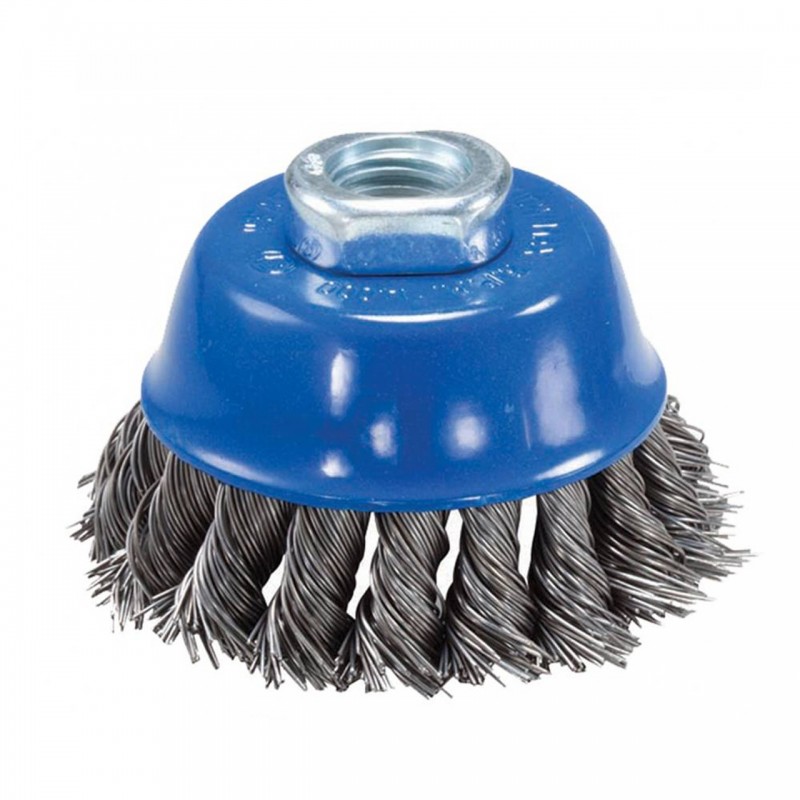
an industrial safety & marine products distribution company
an industrial safety & marine products distribution company
A wire cup brush is a versatile industrial tool designed for surface preparation, cleaning, deburring, and finishing tasks. It consists of wire filaments arranged in a cup shape, typically mounted on power tools like angle grinders. Wire cup brushes are essential for removing rust, paint, scale, and other contaminants from metal surfaces.
 Secured
Secured
 Fast Delivery
Fast Delivery
 7 days Return
7 days Return
1. Crimped Wire Cup Brushes
Design: Wire filaments are crimped, offering flexibility and conformability.
Applications: Ideal for light to medium-duty tasks such as removing light rust, paint, and scale.
Materials: Commonly made from carbon steel, stainless steel, or brass.
Speed: Typically used at lower speeds (up to 12,500 RPM) for controlled cleaning.
Example: Tanis Brush offers crimped wire cup brushes in various sizes and materials
2. Knotted Wire Cup Brushes
Design: Wire filaments are twisted into knots, providing a more aggressive brushing action.
Applications: Suitable for heavy-duty tasks like weld cleaning, removing heavy rust, and scale.
Materials: Typically made from carbon steel or stainless steel.
Speed: Designed for higher speeds (up to 12,500 RPM) for efficient material removal.
Example: Bosch offers carbon steel knotted wire cup brushes for heavy-duty cleaning applications .
3. Abrasive Nylon Cup Brushes
Design: Nylon filaments infused with abrasive particles.
Applications: Ideal for cleaning delicate surfaces, polishing, and light deburring without damaging the base material.
Materials: Nylon filaments with embedded abrasives.
Speed: Used at moderate speeds for controlled cleaning.
Example: Cocker-Weber Brush Co. provides abrasive nylon cup brushes suitable for delicate surface cleaning
Diameter: Ranges from 1¾" to 6" or more, depending on the application and surface area.
Wire Size: Common sizes include 0.014" to 0.020", affecting the aggressiveness of the brush.
Trim Length: Typically between ¾" and 1¼", influencing the brush's reach and material removal capacity.
Arbor Hole Size: Standard sizes include ¼", 5/8"-11, and M14, ensuring compatibility with various power tools.
Maximum RPM: Ranges from 6,600 to 12,500 RPM, depending on the brush type and material
Surface Preparation: Cleaning and preparing surfaces for painting or coating.
Deburring: Removing sharp edges and burrs from metal parts.
Weld Cleaning: Eliminating weld spatter and oxidation.
Rust and Paint Removal: Restoring metal surfaces by removing rust and old paint layers.
Polishing: Achieving a smooth finish on metal surfaces
When selecting a wire cup brush, consider the following factors:
Material Compatibility: Ensure the brush material is compatible with the workpiece material to prevent contamination.
Application Type: Choose a crimped wire brush for light cleaning and a knotted wire brush for heavy-duty tasks.
Tool Compatibility: Verify that the brush's arbor hole size matches your power tool's spindle size.
Speed Rating: Ensure the brush's maximum RPM rating aligns with your tool's operating speed.
By considering these factors, you can select the appropriate wire cup brush to achieve optimal results in your specific application.
Specific References